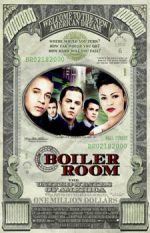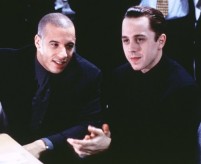|
Boiler Room
|
| |
 |
USA,
2000. Rated R. 119 minutes.
Cast: Giovanni Ribisi, Vin Diesel,
Nia Long, Nicky Katt, Scott Caan, Ron Rifkin, Jamie Kennedy, Tom Everett
Scott, Ben Affleck
Writer: Ben Younger
Music: The Angel
Cinematographer: Enrique Chediak
Producers: Jennifer and Susan
Todd
Director: Ben Younger
|
| Grade:
B- |
Review
by Jeff Vorndam |
 n
the context-less world of the theatrical trailer, Boiler Room looks like
a pale retread of Wall Street and Glengarry Glen Ross. You can
almost hear the stuffed shirts at the studio saying, "add Ben Affleck and some
gangsta rap and you've got a whole new spin on greed, updated for the nineties!"
Boiler Room doesn't retread the two earlier films, though. It parodies
them, and stakes out new territory as it attempts to explain how our cynical
postmodern culture's ethos leads us down a familiar path of remorseless self-concern.
When it's cooking, Boiler Room skewers the capitalist drive and masculine
chest-thumping that accompany success defined as a material quantity. The film
goes off-boil in several patches, though, with cringeworthy domestic melodrama
and an irrelevant romantic subplot. Thankfully, on DVD you'll be able to skip
the awkward serious parts and revel in the manic freewheeling "fun" scenes.
n
the context-less world of the theatrical trailer, Boiler Room looks like
a pale retread of Wall Street and Glengarry Glen Ross. You can
almost hear the stuffed shirts at the studio saying, "add Ben Affleck and some
gangsta rap and you've got a whole new spin on greed, updated for the nineties!"
Boiler Room doesn't retread the two earlier films, though. It parodies
them, and stakes out new territory as it attempts to explain how our cynical
postmodern culture's ethos leads us down a familiar path of remorseless self-concern.
When it's cooking, Boiler Room skewers the capitalist drive and masculine
chest-thumping that accompany success defined as a material quantity. The film
goes off-boil in several patches, though, with cringeworthy domestic melodrama
and an irrelevant romantic subplot. Thankfully, on DVD you'll be able to skip
the awkward serious parts and revel in the manic freewheeling "fun" scenes.

Boiler Room is the debut feature for writer-director Ben Younger, who
came up with the idea when he interviewed for a job and was blasted for thirty
minutes by nonsensical talk of high commissions with nary a word of what the
job actually entailed. You've probably seen those ads in your newspaper: "Tired
of the rat race? Want to earn $12,000 in one month? The future is in
your hands! Call now." Logic says the job is a scam–but it's tempting. Easy
money, earned quickly and in large amounts, is every no-account slacker's dream.
Enter Seth Davis (Giovanni Ribisi), a 19 year-old college dropout who
earns his scratch running an illegal gambling casino from his home. He's
making some decent money, but he knows it's only a matter of time before
he's busted. More importantly to him, his father (Ron Rifkin) is a Federal
Judge, and is disowning Seth unless he gets his act straight and finds
a respectable job. One night, as Seth is behind the dealer table, his bonehead
friend Adam (Jamie Kennedy) brings in a work associate, Greg Weinstein
(Nicky Katt). If Boiler Room were a cartoon, Seth's eyes would turn
into dollar signs when Greg carelessly unloads a large amount of cash at
the table and intimates that similar riches await Seth if he wants to come
work for him. Greg works for J.T. Marlin, a small brokerage firm out in
Long Island. Seeing guys his age driving Ferraris and talking smack quickens
Seth's pulse. He just wants a piece of the action that seems ripe for the
taking, and his attitude is reminiscent of the gangsters in Goodfellas,
reasoning that the suckers were the working stiffs while the guys with
balls were going out and making it happen.
At J.T. Marlin, the new recruits run through the buzzsaw of corporate trainer
Jim Young (Ben Affleck, channeling Alec Baldwin). He even refers overtly to
Glengarry Glen Ross in his opening tirade. Greed is no longer a philosophy,
it's an aphorism, slimmed down and digested as a pre-requisite for the lifestyle
espoused by the unruly frat boys of J.T. Marlin. When they're not bilking hapless
podunks out their hard-earned pensions and savings, the lads go out to bars
and pick fights with blue-bloods from Wall Street. The parallels to gangsterism
are driven home in the casting of Scott Caan (channelling his dad, James Caan,
a.k.a. Sonny Corleone) as a hotheaded thug in a shirt and tie. The atmosphere
at work is where the film gets its name–screaming and pleading over telephone
calls, piquantly profane one-upmanship, and febrile desperation. Every scene
at the workplace is charged and dangerously seductive. Seth gets off on the
power trip of bending the weaker-willed doormats on the other end of the phone
line. We see that by leaving his modest gaming racket and going into this shady
brokerage, Seth has compounded his original problems. He's aware of his amorality
at the same time he's exploiting it. To assuage his conscience pangs, he investigates
more about J.T. Marlin, and his findings are unsurprisingly dismaying. 
Like so many recent movies, Boiler Room begins intriguingly but putters
as it unfolds and eventually settles for a less interesting, standard morality
play. The verve that accompanies the workplace scenes becomes turgid when Seth
confronts his conscience and attempts to reconcile with his father. For much
of the film, we are laughing with the characters, but when Seth and his
father have a heart-to-heart, the dialogue is so flat that we laugh at
the banality of it. It's like changing channels from a movie to a Very Special
Episode of 90210. Seth's father-complex is taking the Wall Street references
too far–doesn't Younger realize that those were the bad parts of Wall
Street? When the guys from work gather around the TV and quote Gordon Gecko
as he speaks, it's funny, and it's a commentary on how we're getting our ideas
from movies and television rather than real people or actual heroes. When Seth
hooks up with the secretary Abbie (Nia Long), we endure a blase romance that
scarcely outstrips the odious Darryl Hannah/Charlie Sheen love story from Wall
Street. Thankfully, Younger doesn't further cloud his story by drawing attention
to the interracial aspect of Seth and Abbie's romance. When the movie concluded,
I was left with a sour taste, like the film had gone past its expiration date.
It's frustrating to see a good film go soft and easy.
There's enough to like to give Boiler Room a recommendation, though.
The hiphop soundtrack further reinforces the connection with gangsterism, and
Ribisi's voiceover is littered with street-speak. They may be white suburban
boys, but their fantasy is that of a fur-coat wearing crack-slingin' gun-toting
pimp. Gangsta rap's braggadocio mirrors the swagger of the cocksure salesman,
and its pulse moves the film's quick editing. Giovanni Ribisi is a fine actor.
His voice-over work is marvelous, mixing the right amount of regret and pride
in his tale of where he went wrong. Stealing the show though is Vin Diesel,
who plays a rival to Nicky Katt's character at the firm. Diesel has the physical
presence and demeanor to back his bold words up, and the eyes to suggest he's
not as cold-blooded as he pretends. His low voice coos entreatingly to the chumps
to whom he sells his worthless stock. He's far more convincing than Affleck,
whose Alec Baldwin impersonation lacks Baldwin's steely poise. The lack of poise
ultimately fells the film. Unsure of its convictions, it opts for conventionality,
but not before giving us a glimpse of edgy gusto.
Review
© March 2000 by AboutFilm.Com and the author.
Images © 2000
New Line Cinema. All Rights Reserved.



